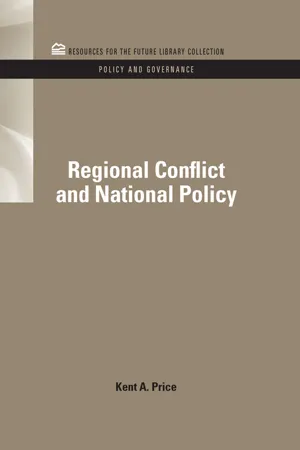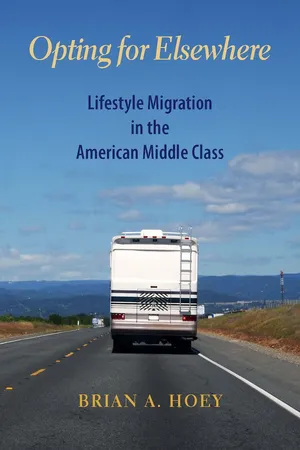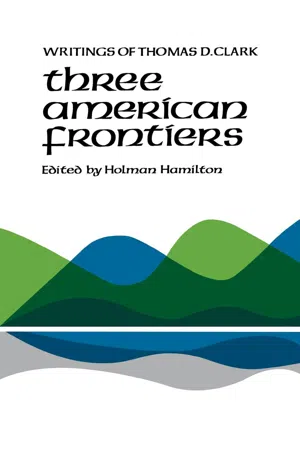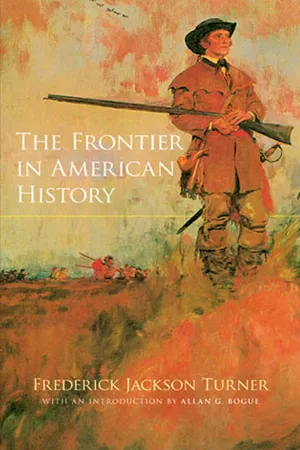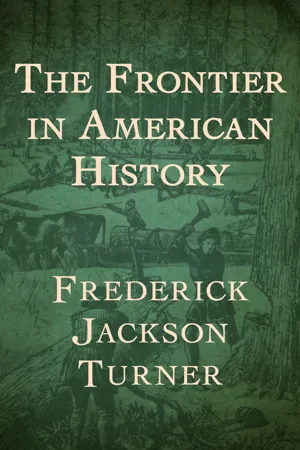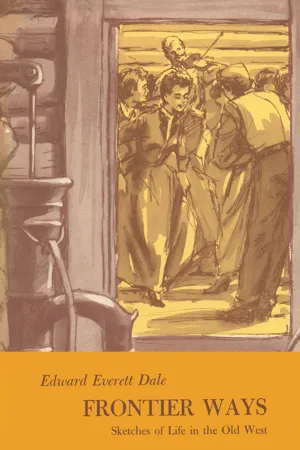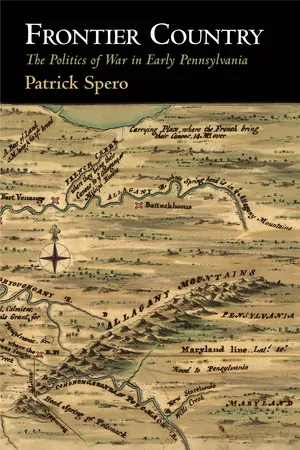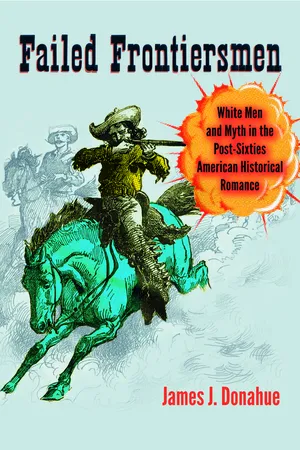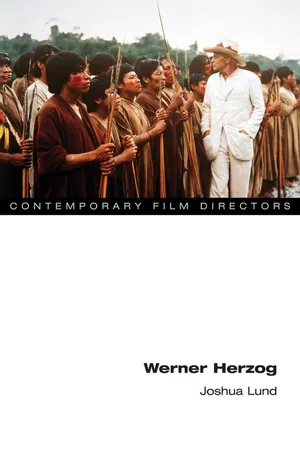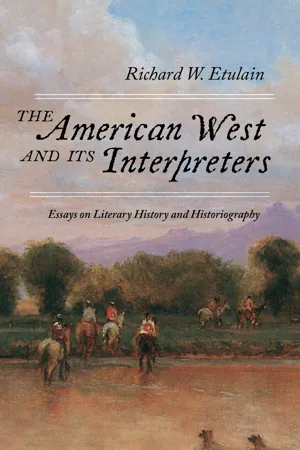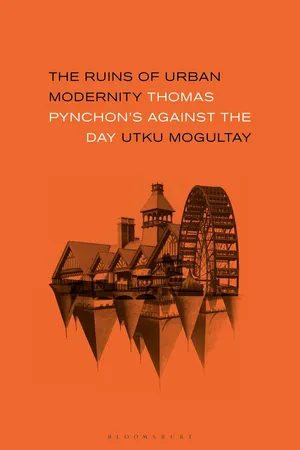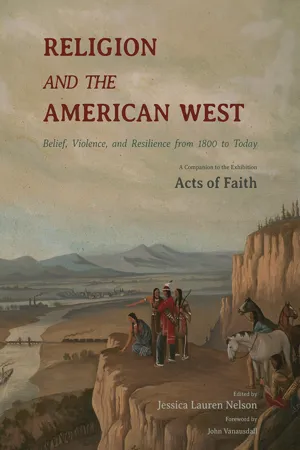History
American Frontier Culture
American Frontier Culture refers to the unique way of life and societal norms that developed in the American frontier during the westward expansion in the 18th and 19th centuries. It encompassed elements of individualism, self-reliance, and a pioneering spirit, as well as interactions with Native American tribes and the impact of the frontier on shaping American identity and values.
Written by Perlego with AI-assistance
Related key terms
12 Key excerpts on "American Frontier Culture"
- eBook - ePub
- Kent A. Price(Author)
- 2013(Publication Date)
- RFF Press(Publisher)
American development has exhibited not merely advance along a single line, but a return to primitive conditions on a continually advancing frontier line, and a new development for that area. American social development has been continually beginning over again on the frontier. This perennial rebirth, this fluidity of American life, this expansion westward with its new opportunities, its continuous touch with the simplicity of primitive society, furnish the forces dominating American character. The true point of view in the history of this nation is not the Atlantic coast, it is the Great West." See F. J. Turner, "The Significance of the Frontier in American History," in The Frontier in American History (New York, Henry Holt, 1920) pp. 2-3. 2. Ibid., p. 3. 3. The Economist, May 9, 1981, p. 60. 4. The dramatic increases in agricultural productivity due to varietal improvements depended heavily upon an expanding knowledge of genetics, and are largely a twentieth-century phenomenon. 5. The convergence of regional per capita income differentials as a possible consequence of changing energy patterns is explored in some detail in chapter 3. 6. See Richard A. Easterlin, "Regional Income Trends, 1840-1950," in Seymour Harris, ed., American Economic History (New York, McGraw-Hill, 1961) p. 528. 7. In 1840 the settlement frontier had barely crossed the Mississippi River. 8. Advisory Commission on Intergovernmental Relations, Regional Growth: Historic Perspective (Washington, D.C., June 1980) p. 11. 9. One interesting aspect of this "wild card" nature of technological change is that it has included the introduction of certain new industries, for example, electronics, in which natural resource inputs play a relatively minor role. These so-called footloose industries consequently have a considerable degree of freedom in determining their location, and often have chosen sites for their attractive climate or proximity to recreation facilities. - eBook - ePub
Opting for Elsewhere
Lifestyle Migration in the American Middle Class
- Brian Hoey(Author)
- 2014(Publication Date)
- Vanderbilt University Press(Publisher)
4Clearly, the economist Kenneth Boulding had this in mind when he used the expression cowboy economy to describe an American frontier ethic gone wild in the economic sphere with the destructive potential to use up one place in order to seek creative opportunity beyond the horizon. In his time, Turner believed that frontier had become an essential part not only of our nationhood but also of personhood in America.5 While now we may not have the physical frontier, it is reasonable to argue that there is a lingering and powerfully motivating sense of geographic mobility offering possibilities for personal growth and renewal together with the simple but captivating allure of new places.Lifestyle migrants with whom I worked made explicit comparisons between places left behind and those to which they moved. The sociologist Michael Bell has commented on the importance of such a contrast between places in his study of a small town in the hinterlands of London that he called Childerley—difference that was self-consciously used as a source of self-identity for newcomers and longtime residents alike.6 Similarly, Lee Cuba’s study of the construction of community and identity in Alaska identifies how contrast between places of origin and destination may be actively employed by migrants to intensify their identification with destination communities—just as a compelling notion of the Frontier found saliency and staying power from the juxtaposition of prevailing cultural images of nature and civilization. Drawing on work regarding the formation of subcultures in urban contexts by Claude Fischer in the 1970s, Cuba explores on the Alaskan “frontier” how geographic mobility that defines the experience of the majority of residents there—rather than diminishing the role of place in formation of individual and collective identity—intensifies a self-conscious, deliberate identification with place. As Cuba notes, “Mobility, and the concomitant opportunities it brings for interaction and comparison, provides the context for how residents acquire and how others attribute to them an identity as Alaskans.”7 - eBook - ePub
Three American Frontiers
Writings of Thomas D. Clark
- Thomas D. Clark, Holman Hamilton(Authors)
- 2021(Publication Date)
- The University Press of Kentucky(Publisher)
PART I. THE FRONTIER WEST AND SOUTH CHAPTER ONE WESTWARD EXPANSION THE SOCIAL MEANING OF THE FRONTIER Frontier expansion in America closely resembled the roll of the sea. It broke, billowed and eddied against the various physical and social barriers which it encountered. The pattern of expansion was never uniform over any considerable geographical area, nor within any large segmented part of the more localized social organization. The movement bore telltale marks of the traditional origins of peoples and institutions—the flavor and coloration of the peculiar traditions of continental Europe, England, and the eastern Atlantic Coast. The frontier path was strewn, like that of a vast glacier, with the remains of older cultures, easily identified by their peculiar natures and characteristics. . . . When settlers came in contact with woods, prairies and plains, they started life anew at elementary levels. Social and economic advances were almost always achieved from the same simple beginnings. The frontier was the place of trail and ground breaking in new country, and of establishing afresh social and political institutions. Settlers coming into contact with the vast areas of virgin lands and mineral resources behaved much alike, whether in the pine lands cotton belt or the mountainous gold diggings. . . . The safest general observation to be made about American frontier history is that it is variegated, erratic, colorful and spacious. It combines the broad interpretations of both human and national history with the most fragmentary details of local history. In its broader meaning the history of the frontier is the account of the molding of people of diverse origins and motives into a fairly homogeneous national group - eBook - ePub
- Frederick Jackson Turner, Allan G. Bogue(Authors)
- 2012(Publication Date)
- Dover Publications(Publisher)
Even the slavery struggle, which is made so exclusive an object of attention by writers like Professor von Holst, occupies its important place in American history because of its relation to westward expansion. In this advance, the frontier is the outer edge of the wave — the meeting point between savagery and civilization. Much has been written about the frontier from the point of view of border warfare and the chase, but as a field for the serious study of the economist and the historian it has been neglected. The American frontier is sharply distinguished from the European frontier — a fortified boundary line running through dense populations. The most significant thing about the American frontier is, that it lies at the hither edge of free land. In the census reports it is treated as the margin of that settlement which has a density of two or more to the square mile. The term is an elastic one, and for our purposes does not need sharp definition. We shall consider the whole frontier belt, including the Indian country and the outer margin of the “settled area” of the census reports. This paper will make no attempt to treat the subject exhaustively; its aim is simply to call attention to the frontier as a fertile field for investigation, and to suggest some of the problems which arise in connection with it. In the settlement of America we have to observe how European life entered the continent, and how America modified and developed that life and reacted on Europe. Our early history is the study of European germs developing in an American environment. Too exclusive attention has been paid by institutional students to the Germanic origins, too little to the American factors. The frontier is the line of most rapid and effective Americanization. The wilderness masters the colonist. It finds him a European in dress, industries, tools, modes of travel, and thought. It takes him from the railroad car and puts him in the birch canoe - eBook - ePub
- Frederick Jackson Turner(Author)
- 2015(Publication Date)
- Open Road Media(Publisher)
Even the slavery struggle, which is made so exclusive an object of attention by writers like Professor von Holst, occupies its important place in American history because of its relation to westward expansion. In this advance, the frontier is the outer edge of the wave—the meeting point between savagery and civilization. Much has been written about the frontier from the point of view of border warfare and the chase, but as a field for the serious study of the economist and the historian it has been neglected. The American frontier is sharply distinguished from the European frontier—a fortified boundary line running through dense populations. The most significant thing about the American frontier is, that it lies at the hither edge of free land. In the census reports it is treated as the margin of that settlement which has a density of two or more to the square mile. The term is an elastic one, and for our purposes does not need sharp definition. We shall consider the whole frontier belt, including the Indian country and the outer margin of the “settled area” of the census reports. This paper will make no attempt to treat the subject exhaustively; its aim is simply to call attention to the frontier as a fertile field for investigation, and to suggest some of the problems which arise in connection with it. In the settlement of America we have to observe how European life entered the continent, and how America modified and developed that life and reacted on Europe. Our early history is the study of European germs developing in an American environment. Too exclusive attention has been paid by institutional students to the Germanic origins, too little to the American factors. The frontier is the line of m ost rapid and effective Americanization. The wilderness masters the colonist. It finds him a European in dress, industries, tools, modes of travel, and thought. It takes him from the railroad car and puts him in the birch canoe - eBook - ePub
Frontier Ways
Sketches of Life in the Old West
- Edward Everett Dale(Author)
- 2010(Publication Date)
- University of Texas Press(Publisher)
It is not to primitive peoples of an alien race and a different color, however, that America owes most of its present-day culture. Much of it is rooted in Old World soil, though perhaps more of it than we think is the product of our own plains and forests. Even that part of it originally brought from Europe has been so colored and transformed by a new environment as to affect greatly its tempo and pattern. It has changed or been modified to such an extent as to be scarcely recognizable by its originators.From the beginning of our country’s history to the present, many people of Europe have asserted that America is a nation of money grubbers whose people have little interest in scholarship, and above all, no understanding or appreciation of art, music, and literature. Emerson’s immortal essay, The American Scholar, was in a sense our intellectual declaration of independence, but even today, over a hundred years after it was written, not a few people of the United States are still all too willing to accept the dictum of Europe as law and gospel and to insist that only by long and patient study abroad can one hope to become a real artist.In the older settled regions of the East, moreover, even those who are willing to admit that America may have something of an intellectual and cultural nature to contribute to the world are likely to think that the people of the frontier regions of the West were gross materialists, interested only in things of the flesh or in supplying their own physical needs. This is far from true and has never been true of any frontier area, whether it was that of Piedmont Virginia in 1690, of Kentucky and Tennessee in 1790, or of Oklahoma and Texas in 1890. Since pioneer life in America has always been essentially the same, however, it seems well in discussing the cultural life and interests of the frontier to choose the most recent one, which is that of the West approximately sixty to seventy years ago.Obviously it would be impossible to give in a brief chapter any complete discussion of the cultural life of frontier people in all of its aspects. In consequence attention will be directed only to three phases of the pioneer settler’s culture—art, music, and literature.The roots of the cultural interest of pioneer peoples must be sought in the self-selection of those who migrated west to occupy virgin lands on the American frontier. As a rule they belonged to a certain type. When Longfellow, speaking of the Pilgrims, said: - eBook - ePub
Frontier Country
The Politics of War in Early Pennsylvania
- Patrick Spero(Author)
- 2016(Publication Date)
- University of Pennsylvania Press(Publisher)
CODA Frontiers Meanings, Controversies, and New EvidenceFrontier: few words have inspired American historians to spill more ink. For much of the twentieth century, many historians placed the word at the heart of the American experience. Late in the century, other historians took a decidedly different tack, arguing that “the f-word” be banished. My reanimation of the word, then, would seem to require some explanation.The origins of the frontier controversy date to 1893, when Frederick Jackson Turner delivered his presidential address, “The Significance of the Frontier in American History,” to the American Historical Association. One sentence in Turner’s essay is frequently used to define the essence of his thesis: “The existence of an area of free land, its continuous recession, and the advance of American settlement westward, explain American development.” For Turner, the existence of a frontier region (“an area of free land”) provided a safety valve for the social and economic discontent that had plagued Europe. This safety valve gave rise to high levels of property ownership, which in turn spurred the individualism that defined America’s political and economic character. Finally, for Turner, “the advance of American settlement” explained the United States’ geographic expansion as part of a civilizing mission that transformed a wilderness into a modern nation. This process defined America’s national character as frontiersmen and pioneers built local political institutions that were influenced by their circumstances and shaped the politics of the nation more generally. For Turner, the frontier was thus a place in which the process of Americanization occurred.1 - eBook - ePub
Cultural Frames, Framing Culture
White Men and Myth in the Post-Sixties American Historical Romance
- James J. Donahue(Author)
- 2015(Publication Date)
- University of Virginia Press(Publisher)
upon which the national mythology was built. 7 As I hope to demonstrate throughout the following chapters, the authors included in this study critique the mythology of the American frontier in large part precisely because that mythology has long dominated how we define American cultural values; or, to adapt Silverman, the mythology has created our reality. And in the wake of the various protest movements from the 1960s—including but not limited to the movement against the war in Vietnam, the civil rights movement, and the American Indian Movement 8 —the writers responding to America’s founding mythology show how it has failed our nation by providing a reading of our reality that did not conform with lived experience. As Richard Slotkin explains in Gunfighter Nation: The Myth of the Frontier in Twentieth-Century America, the third volume of his study of the development of American frontier mythology, the myth of the American frontier has become central to America’s efforts at self-definition: The myth of the frontier is our oldest and most characteristic myth, expressed in a body of literature, folklore, ritual, historiography, and polemics produced over a period of three centuries. According to this myth-historiography, the conquest of the wilderness and the subjugation or displacement of the Native Americans who originally inhabited it have been the means to our achievement of a national identity, a democratic polity, an ever-expanding economy, and a phenomenally dynamic and “progressive” civilization - eBook - ePub
- Joshua Lund(Author)
- 2020(Publication Date)
- University of Illinois Press(Publisher)
The subject of countless cultural artifacts, both high and low, the frontier’s canonization as the center of American identity wouldn’t coalesce until it was essentially exhausted as political space, as an object of accumulation, closed to further expansion. In convenient harmony with Stroszek, the writer who would establish the framework for the hegemony of the frontier in the American psyche was a Wisconsinite, the titan of American historiography at the turn of the century, Frederick Jackson Turner. In 1893 Turner delivered an address before the American Historical Association at the World’s Columbian Exposition in Chicago. It was called “The Significance of the Frontier in American History” ([1893] 1921) and so massive was its impact in setting the agenda for historiographical explorations of the nature of American political culture that it took on a succinct nickname: “frontier thesis.” In this extraordinary paper, Turner argues that what makes American history essential, and its cultural identity exceptional, isn’t merely the frontier in and of itself, as a constitutive fact of the cartography of the country. Rather, it’s the way in which the frontier penetrates American civilization. The Hegelian model of historical movement saw in America a kind of escape hatch for the population pressures of Europe, a space in which that civilization could further unfold and reinvent its internal logic, and this notion would be translated by generations of historians and race scientists throughout the nineteenth century as the foundation of various “germ” theories of national identity as a kind of essence of spirit. The movement west, then, is implacable, dominant, and white. Turner’s dialectic comes off as more rigorous, and less jingoistic, proposing that the essential point of frontier space is not the way in which European civilization fills it up, pacifies it - eBook - ePub
The American West and Its Interpreters
Essays on Literary History and Historiography
- Richard W. Etulain(Author)
- 2023(Publication Date)
- University of New Mexico Press(Publisher)
Intrigued with the relationship between West and East, he concluded, as Frederick Jackson Turner would in the 1890s, that the frontier West was sharply different from the eastern part of the United States. Second, he noted that the West was changing and moving from a frontier toward a postfrontier society. These two themes—the horizontal bearing between East and West and the vertical connection between frontier and postfrontier Wests—are pivotal concerns for a consideration of the changing interpretations of western American cultural history. 2 Although Lord Bryce expressed interest in the cultural development of the frontier West, few American historians of his time were intrigued with the subject. For example, Hubert Howe Bancroft, the most important western historian writing before Frederick Jackson Turner, dealt with numerous facets of western life in his multivolume histories of the West, but he did not pay nearly as much attention to frontier literature, religion, education, or art as he did to military, political, and economic affairs. Nor did his brief discussions of western cultural history suggest that he wished to examine how much the East influenced the West. 3 Even before Bancroft completed his synthetic essays contained in his final volumes, Turner had begun publishing his pathbreaking articles of the 1890s and early twentieth century. Turner’s contention that the frontier was the major shaping force in American life prevailed in graduate schools for at least two generations. Similarly, the subjects that he stressed have been the topics most western historians emphasized until as recently as a decade or two after World War II - eBook - ePub
The Ruins of Urban Modernity
Thomas Pynchon's Against the Day
- Utku Mogultay(Author)
- 2018(Publication Date)
- Bloomsbury Academic(Publisher)
The frontier settler thus followed in the footsteps of the self-sufficient yeoman farmer, in that both were seen as morally superior to the urbanite. Undergoing a process of decivilization, the frontier settler would be “denuded of the disabling sophistications of urban culture” (Mendieta 2009: 210). Advancing into the wilderness, he would adapt to a brute environment in which lawlessness reigns, but eventually reemerge as a new man, as “an American individualist—tough, independent, resourceful, manly” (Lears 2009: 40). More than just demarcating a geographical territory, the frontier then figures as a myth ical realm, a “liminal space of both death and birth, a kenotic space in which the old self is emptied and eviscerated so that a new self can be born” (Mendieta 2009: 214). Yet, given that the 1890 United States Census had declared the end of the concept of the frontier, Turner also had to face the prospect that the future might belong to urban America. 2 In this sense, his frontier thesis must be seen as an attempt “to make sure that the American past at least was understood to be an anti-urban romance” (Conn 2014: 20). Notwithstanding that Turner’s paper has been sharply criticized for overstating the significance of frontier life and disregarding the role of cities in the development of American democracy, it remains “without question one of the most formative and influential pieces of scholarship” (Mendieta 2009: 212) in US history. 3 Moreover, the frontier thesis obviously struck a popular chord with many audiences, coinciding with the increasing “transformation of frontier history into mass-marketed entertainment and popular mythology” (Lears 2009: 40). Accordingly, frontier mythology was consolidated and perpetuated over decades in countless novels, paintings, stage performances, and movies - eBook - ePub
Religion and the American West
Belief, Violence, and Resilience from 1800 to Today
- Jessica Lauren Nelson, Jessica Lauren Nelson(Authors)
- 2023(Publication Date)
- University of New Mexico Press(Publisher)
4.1. This puzzle invited children to put together a map of the United States, reinforcing the idea that the “natural” boundaries of the country stretched from the Pacific to the Atlantic. McLoughlin Brothers, A New Dissected Map of the United States, ca. 1887, cardboard, paper, 2 × 15 ¼ × 10 ⅝ in. The Liman Collection, 2000.547. New-York Historical Society.On the evening of July 12, 1893, Turner stood on the auditorium stage of the Chicago Art Institute, as part of the fair’s World’s Auxiliary Congress, where he spoke at the 9th Annual Meeting of the American History Association. Here, this newly minted historian from Johns Hopkins University proposed that it was not religion, the “germs” of European influence, or even heroic individuals that made Americans liberty-loving, hardworking, and democratic, but the natural effects of the frontier environment on those encountering it.While grounded in the episteme of late nineteenth-century science, Turner’s “Frontier Thesis” retained all the hallmarks of mythical storytelling. Since the landing of Columbus, he remarked in his speech, “America has been another name for opportunity,” and it has been this “incessant expansion” that has set the tone for the people of the United States. America’s unique characteristics of individualism, democracy, coarseness, and strength, he argued, came from converting the primitive spaces of the American frontier into a complex array of cities and communities. White English-speaking men, he urged, stood at the helm of this “ever retreating frontier” that separated “savagery from civilization” because, perforce, it both embodied and exemplified a “perennial rebirth” from which liberty-loving Americans sprung.2The myth of the frontier line served to privilege American institutions and to justify the triumph of civilizing forces over those that same myth held to be savage and primitive. Believing the myth true imparted moral authority and righteousness to conquest and an expanding White American empire inevitable. Whether these developments of American expansion were theologically justified, as they had been by earlier ministers and historians, or scientifically justified, as the natural consequence of settling the open frontier, as Turner argued, the story of American expansion and conflict remained a monopoly of the privileged and powerful.
Index pages curate the most relevant extracts from our library of academic textbooks. They’ve been created using an in-house natural language model (NLM), each adding context and meaning to key research topics.
